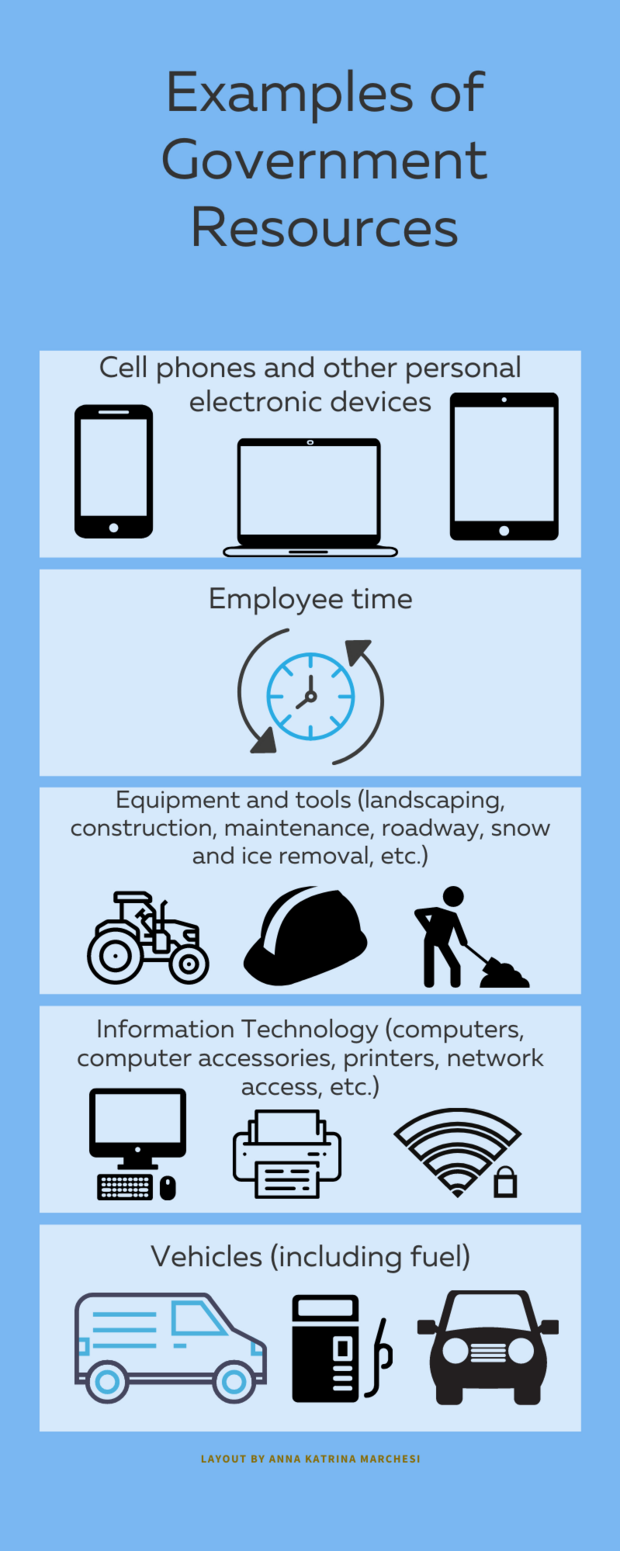Overview of Acceptable Use Policies
When starting a new job, almost all government employees must sign their employer’s acceptable use policy. Generally, we think of acceptable use policies as solely for information technology (IT) purposes. Although acceptable use policies are extremely important for IT, the Office of the Inspector General (OIG) recommends that public employers address other government resources, including vehicles, equipment, tools, cell phones, other personal electronic devices and employee time, in a comprehensive “Acceptable Use of Government Resources” policy.
Acceptable use policies should govern employee use of government-owned resources and access to information. These policies should outline activity that is allowed, and more importantly, activity that is not allowed.
In general, public employees should not use government-owned resources for personal matters or outside activities.
Acceptable use policies should also address disciplinary action the employer may take in response to the misuse of government property. Disciplinary action can include a range of consequences, from verbal or written warnings to termination to the pursuit of criminal charges.
After working in the same office for an extended period, employees may become comfortable using government resources for outside activities. For this reason, employer communication is critical to the success of an acceptable use policy. Employees should be fully aware of:
- the conduct permitted and prohibited under the policy;
- the consequences for violating the policy; and
- their point of contact within the organization for questions about the policy.
Employers should also require that all employees sign an acknowledgment of the policy. Whenever the agency updates its policy, the employer should obtain a new acknowledgment signature from employees. In addition, employers should implement employee training on the policy. This will reinforce the policy’s importance and highlight possible disciplinary action for failure to adhere.
For example, when employees use government equipment for personal activities, they add unnecessary wear and tear, shortening the equipment’s expected lifespan. Such misuse can also unnecessarily increase fuel costs.
Although time is not a tangible resource, it can also be misused. Time fraud can lead to significant financial loss for public entities. For example, if an employee who earns $25 per hour takes an extra half hour for lunch every day, they waste 2.5 hours per week, which equals $62.50. This pattern of behavior can quickly add up to thousands of dollars of wasted funds for public entities. Employers must hold their employees accountable for accurate time use and attendance, and comprehensive acceptable use policies can help accomplish this.
The absence of acceptable use policies can leave an agency, town or municipality vulnerable to fraud, waste and abuse and open to potential legal liability.
The OIG is tasked with investigating public fraud, waste and abuse throughout Massachusetts. See M.G.L. c. 12A, § 7. This includes investigations into abuse of government-owned resources.
OIG Investigation Involving Acceptable Use Policies
For example, in January 2016, the OIG issued a public letter to the interim president of Massachusetts Bay Community College (MBCC) that detailed an investigation of MBCC’s Facilities Department. The investigation revealed that two employees operated a private landscaping business during work hours, using state-owned equipment. The OIG concluded that this conduct violated state ethics law and could rise to the level of criminal activity. See M.G.L. c. 268A, § 23(b)(2) (prohibiting public employees from using their official positions to secure unwarranted privileges).
The OIG recommended that MBCC take corrective actions, including:
- conduct an internal investigation and take appropriate disciplinary action against the employees;
- consider requesting that the local district attorney’s office file criminal charges; and
- refer the matter to the State Ethics Commission.
The OIG also recommended that MBCC establish a written policy detailing the appropriate use of MBCC equipment and other resources.
More recently, the OIG investigated the former Commonwealth Print Services director for misuse of government resources. A joint investigation by the OIG and the Attorney General’s Office found that the director used state printing resources for his own printing business, and the Attorney General’s Office filed criminal charges. For more information about this case, see our article Recent OIG Investigations in this issue.
The OIG actively investigates state and local government employees, as well as contractors, who misuse government time, resources or property. If you suspect an employee or contractor of misuse, contact the OIG through one of our fraud hotlines.
Additional Resources
Contact for OIG Bulletin, February 2021: Why Are Acceptable Use Policies Important?
Online
Phone
Address
| Date published: | February 25, 2021 |
|---|

